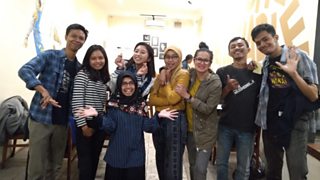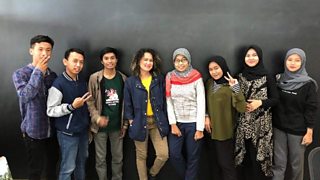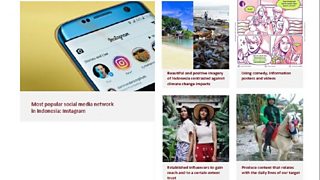Understanding a generation of Indonesian youth to engage them on climate change
Ankur Garg and Anisha Ratan
Country Director, Indonesia and Research Manager
Tagged with:

Our focus group, project manager and research manager in Indonesia. Credit: 主播大秀 Media Action
Understanding our audiences is integral to all that we do at 主播大秀 Media Action. As part of our exciting new project Kembali Ke Hutan (Return to the Forest) focusing on the sustainability of Indonesian forests and natural resources, we needed to reach Indonesia’s millennial generation, inspiring them to understand and engage on critical environmental choices for their future.
Young people really are Indonesia’s future: predicts 46% of the population will be under age 30 by 2030, with a majority in urban areas. Already the country has over 350 million mobile subscriptions, and 150 million active social media users – most of them on mobile. Inspiring them to engage on climate action requires us to reach them where they are: online.
Our approaches
We used artificial intelligence to analyse online data as well as more traditional methods such as focus groups to develop deeper insights.
Techniques drawing on artificial intelligence helped gather, sort and analyse information from 118 sources across 16 different areas – from lifestyle to local community forums. We used these results to create archetypes of young Indonesians, and then followed this up with a week-long online focus group with 50 urban youth aged 18-25, exploring their online behaviours: their interests, how they engage with important issues – from politics to the environment – and how they behave on social media. We combined this with traditional face-to-face focus groups with urban young people, active members of community-based youth organisations, to gain a thorough understanding of what motivates them to engage with environmental issues.
Who are Indonesia’s young people?
Based on this data, we found urban youth value their social identity, to define their place within Indonesian society and influence their social networks. They are willing to think about and engage with political and social issues through online platforms.
“We represent the people of East Kalimantan when we come to the government and tell them about the issues that have to be addressed.” member aged 18-25, from Samarinda
However, we also learned that frustrating interactions with government in the past among 22-30 year olds, and feelings of distance and apathy in 18-21 year olds, contributed to their perceived disinterest and inability to act.
Based on segmentation from the AI/Semiotics study we established the following ‘groups’ of young people:
- ‘Regular Consumers’: These young Indonesians lead relatively structured lives with clear routines, and whilst some environmental issues are important to them, they are more focused on doing well academically and obtaining good jobs. Whilst they spend a lot of time on social media, it tends to be for hobbies, travelling, food or entertainment, and a place to connect with others, rather than as a forum for debate or taking action.
- ‘Loud and Proud Crusaders’: This group considers social media a key forum for taking action on issues relating to climate change. Influencers and well-known names help grab their attention, and they engage with content with a clear link to their daily lives. Most were unfamiliar with the term ‘green growth’, and as a result didn’t know what actions they could take.
- ‘Quiet Heroes’: They are interested in environmental and social issues, and believe they should lead by example and change themselves first. They start with smaller actions - not littering, joining environmental organisations, encouraging friends to do so too, for instance through information.
- ‘Aesthetic indulgence’: This youth ‘group’ is all about travel and natural beauty – they act out of concern to protect areas of natural beauty for others to enjoy.
- ‘Guardians of Future Generations’: Finally, this group is driven by aspirational and positive examples that focus on social issues and the environment, either locally or nationally; they prefer to act through community-based initiatives.
"It’s in my nature, part of my conscience to [be an activist]. It calls to me.” Aksi Kamisan (Youth Good Governance Group) member aged 18-25, from Samarinda
“Resources are limited while the wants of the public are not. The government needs to ensure that [the resources] can be enjoyed by the next generation, that it will not be gone.” member aged 18-25, Jakarta

Our youth group in Surabaya, East Java Credit: 主播大秀 Media Action
What’s next
A platform for young people to voice their concerns and opinions, while feeling part of environmental youth communities and groups, seemed the natural way to build their engagement and public discussion. Social media is being used to help this via our Aksikita brand, , and .
We have used our research findings to inform the content for our national TV programme and digital media. As Instagram is the most popular social media network in Indonesia, we have designed a range of posts to meet the different needs of Indonesian young people, from cartoons to videos, each based around how individuals might be affected and what they can do. This will help engage the 'Quiet Heroes' and 'Regular Consumers' with simple, effective actions they can take.

(Missing Travel), takes young people stuck at home during the pandemic on a virtual journey to their favourite parts of the country – appealing to those who are proud of their country’s beauty – such as the 'Aesthetic Indulgence' group.
Throughout the series, our Digital Manager and Series Host, Jimmi, is accompanied by young people actively working on climate change, to build audience engagement by contrasting beautiful scenery with the impacts of environmental damage.
We’ve also used comedy and social media influencers to help reach those less engaged in environmental issues, and information that appeals to ‘Quiet Heroes’.
With all of this we aim to gain reach, while using informative and questioning content that provokes discussion among our followers, their family and peers – ultimately increasing Indonesians' understanding and awareness of a range of environmental issues and sustainable development challenges. For Indonesia’s coming-of-age generation, this is about the future of their country’s environment and prosperity.
--
Ankur Garg is Country Director for 主播大秀 Media Action in Indonesia, and Anisha Ratan is Digital Research Manager for 主播大秀 Media Action, based in London.
Return to the Forest is funded by NICFI (Norway's International Climate and Forest Initiative). Learn more about the project here.
